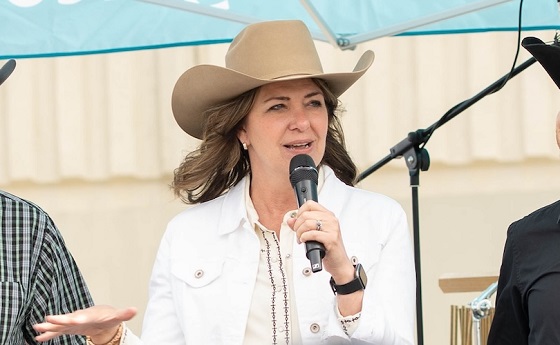Alberta
Canadian gov’t lawyers request jail for Calgary pastor who protested ‘drag queen story hour’ at library

Canadian pastor Derek Reimer is thrown out of a drag queen story time event at a public library in Calgary.
From LifeSiteNews
The Crown is seeking a long probation on top of a jail sentence for Derek Reimer, who believes that despite the ‘egregious sentence proposal,’ ‘there’s a good chance I will go home with my family after the sentencing verdict.’
Government lawyers are seeking a potential one-year jail sentence and probation for a Calgary pastor who was hit with criminal harassment and breaching bail condition charges for protesting “drag queen story hours” targeting children at a public library last year.
Pastor Derek Reimer of Mission 7 Ministries was in Alberta Court of King’s Bench court Thursday for sentencing regarding a guilty verdict issued in October.
Reimer told LifeSiteNews that despite the “Crown’s egregious sentence proposal,” he feels “encouraged that there’s a good chance I will go home with my family after the sentencing verdict.”
“Even if I don’t, I know the Lord will work it out for good and I will rejoice that I’m counted worthy to suffer shame for Jesus’ name,” he added.
In October, Reimer was hit with a criminal conviction and a $500 fine after a judge found him guilty of breaching his bail conditions because he spoke out against a “drag queen story time” event for children at another public library.
In court Thursday, the main Crown prosecutor claimed that Reimer had targeted a library manager with a “personal attack” and “hateful vitriol” and showed a “lack of remorse” after he confronted her to object to the library hosting kids “drag queen story time.”
In court, the Crown used two videos posted by Reimer after the incident to use against him.
The Crown is seeking a long probation on top of a jail sentence to, in its words, keep Reimer “on the straight and narrow” and to “ensure the public remains safe from criminal harassment.”
Reimer’s lawyer, Andrew MacKenzie, argued that the library manager had used the words “upset,” which he claimed do not constitute a type of reaction to one getting harassed.
Judge Heather Lamoureux is now looking at all the facts and has noted that she will consider that Reimer is his family’s sole bread winner and whose wife has a baby on the way before handing him his sentence.
Lamoureux hinted that a conditional sentence “could be more reasonable” than one that carries actual jail time. Sentencing will occur on December 3. MacKenzie has also asked the court for a conditional sentence in lieu of time already spent in jail.
The judge also noted that Reimer’s right to “protest LGBTQ events” is not what the case is about, and he can protest so long as he does not cross the “boundary of harassment” that the Crown has argued occurred.
Pastor: ‘I’m here to serve God’ and ‘expose what the Bible calls darkness and sin’
In court, Reimer noted that he is not the “man the court and the media made me out to be,” adding that is not how he lives his “life now.”
“I’m a man that’s been transformed by God’s grace, nine years ago,” he said, adding, “my past life has a totally different mindset behind it.”
He added that he is “concerned” with what is “happening to Canada” and that he feels he has been called by “God Almighty to preach His word, feed the homeless and protect children.”
“To expose what the Bible calls darkness and sin,” he said, adding, “I’m not here to hurt anybody. I’m here to serve God. What they’re doing is wrong, according to the Bible,” he said.
In late October, Reimer was visited by Calgary Police at his home after he was served a notice of appeal for a judge’s recent acquittal of his charges for protesting transgender story times at public libraries, LifeSiteNews learned.
The notice of appeal concerns a different incident, as reported by LifeSiteNews in September, in which Judge Allan Fradsham ruled that Reimer is not guilty of a criminal offense for protesting a pro-LGBT “drag” event marketed to kids called “Reading with Royalty” that took place at the Seton Public Library in Calgary in February 2023.
Reimer has been arrested many times for protesting “drag queen story time” and other pro-LGBT events.
He has also been the target of harassment for protesting these events. Last April, his van was vandalized with an anti-Christian message as well as a satanic symbol while he was in jail after, yet another arrest related to his pro-family activism.
Last year, Calgary passed a new so-called “Safe and Inclusive Access Bylaw” that disallows “specified protests” both inside and outside all city-owned and affiliated public buildings.
The bylaw means that anyone protesting pro-LGBT events at public buildings will be barred from getting within 100 meters of any such location.
Alberta
Danielle Smith slams Skate Canada for stopping events in Alberta over ban on men in women’s sports

From LifeSiteNews
The Alberta premier has denounced Skate Canada as ‘disgraceful’ for refusing to host events in the province because of a ban on ‘transgender’ men in women’s sports.
Alberta Premier Danielle Smith has demanded an apology after Skate Canada refused to continue holding events in Alberta.
In a December 16 post on X, Smith denounced Skate Canada’s recent decision to stop holding competitions in Alberta due to a provincial law keeping gender-confused men from competing in women’s sports.
“Women and girls have the right to play competitive sports in a safe and fair environment against other biological females,” Smith declared. “This view is held by a vast majority of Albertans and Canadians. It is also common sense and common decency.”
Women and girls have the right to play competitive sports in a safe and fair environment against other biological females.
This view is held by a vast majority of Albertans and Canadians. It is also common sense and common decency.
Skate Canada‘s refusal to hold events in… pic.twitter.com/n4vbkTx6B0
— Danielle Smith (@ABDanielleSmith) December 16, 2025
“Skate Canada‘s refusal to hold events in Alberta because we choose to protect women and girls in sport is disgraceful,” she declared.
“We expect they will apologize and adjust their policies once they realize they are not only compromising the fairness and safety of their athletes, but are also offside with the international community, including the International Olympic Committee, which is moving in the same direction as Alberta,” Smith continued.
Earlier this week, Skate Canada announced their decision in a statement to CBC News, saying, “Following a careful assessment of Alberta’s Fairness and Safety in Sport Act, Skate Canada has determined that we are unable to host events in the province while maintaining our national standards for safe and inclusive sport.”
Under Alberta’s Fairness and Safety in Sport Act, passed last December, biological men who claim to be women are prevented from competing in women’s sports.
Notably, Skate Canada’s statement failed to address safety and fairness concerns for women who are forced to compete against stronger, and sometimes violent, male competitors who claim to be women.
Under their 2023 policy, Skate Canada states “skaters in domestic events sanctioned by Skate Canada who identify as trans are able to participate in the gender category in which they identify.”
While Skate Canada maintains that gender-confused men should compete against women, the International Olympic Committee is reportedly moving to ban gender-confused men from women’s Olympic sports.
The move comes after studies have repeatedly revealed what almost everyone already knew was true, namely that males have a considerable innate advantage over women in athletics.
Indeed, a recent study published in Sports Medicine found that a year of “transgender” hormone drugs results in “very modest changes” in the inherent strength advantages of men.
Additionally, male athletes competing in women’s sports are known to be violent, especially toward female athletes who oppose their dominance in women’s sports.
Last August, Albertan male powerlifter “Anne” Andres was suspended for six months after a slew of death threats and harassments against his female competitors.
In February, Andres ranted about why men should be able to compete in women’s competitions, calling for “the Ontario lifter” who opposes this, apparently referring to powerlifter April Hutchinson, to “die painfully.”
Interestingly, while Andres was suspended for six months for issuing death threats, Hutchinson was suspended for two years after publicly condemning him for stealing victories from women and then mocking his female competitors on social media. Her suspension was later reduced to a year.
Alberta
Alberta’s huge oil sands reserves dwarf U.S. shale

From the Canadian Energy Centre
By Will Gibson
Oil sands could maintain current production rates for more than 140 years
Investor interest in Canadian oil producers, primarily in the Alberta oil sands, has picked up, and not only because of expanded export capacity from the Trans Mountain pipeline.
Enverus Intelligence Research says the real draw — and a major factor behind oil sands equities outperforming U.S. peers by about 40 per cent since January 2024 — is the resource Trans Mountain helps unlock.
Alberta’s oil sands contain 167 billion barrels of reserves, nearly four times the volume in the United States.
Today’s oil sands operators hold more than twice the available high-quality resources compared to U.S. shale producers, Enverus reports.
“It’s a huge number — 167 billion barrels — when Alberta only produces about three million barrels a day right now,” said Mike Verney, executive vice-president at McDaniel & Associates, which earlier this year updated the province’s oil and gas reserves on behalf of the Alberta Energy Regulator.
Already fourth in the world, the assessment found Alberta’s oil reserves increased by seven billion barrels.
Verney said the rise in reserves despite record production is in part a result of improved processes and technology.
“Oil sands companies can produce for decades at the same economic threshold as they do today. That’s a great place to be,” said Michael Berger, a senior analyst with Enverus.
BMO Capital Markets estimates that Alberta’s oil sands reserves could maintain current production rates for more than 140 years.
The long-term picture looks different south of the border.
The U.S. Energy Information Administration projects that American production will peak before 2030 and enter a long period of decline.
Having a lasting stable source of supply is important as world oil demand is expected to remain strong for decades to come.
This is particularly true in Asia, the target market for oil exports off Canada’s West Coast.
The International Energy Agency (IEA) projects oil demand in the Asia-Pacific region will go from 35 million barrels per day in 2024 to 41 million barrels per day in 2050.
The growing appeal of Alberta oil in Asian markets shows up not only in expanded Trans Mountain shipments, but also in Canadian crude being “re-exported” from U.S. Gulf Coast terminals.
According to RBN Energy, Asian buyers – primarily in China – are now the main non-U.S. buyers from Trans Mountain, while India dominates purchases of re-exports from the U.S. Gulf Coast. .
BMO said the oil sands offers advantages both in steady supply and lower overall environmental impacts.
“Not only is the resulting stability ideally suited to backfill anticipated declines in world oil supply, but the long-term physical footprint may also be meaningfully lower given large-scale concentrated emissions, high water recycling rates and low well declines,” BMO analysts said.
-

 Business2 days ago
Business2 days agoCanada’s recent economic growth performance has been awful
-

 Alberta2 days ago
Alberta2 days agoCanada’s New Green Deal
-

 Alberta2 days ago
Alberta2 days agoAlberta’s huge oil sands reserves dwarf U.S. shale
-

 armed forces2 days ago
armed forces2 days agoOttawa’s Newly Released Defence Plan Crosses a Dangerous Line
-

 Health2 days ago
Health2 days agoSaskatchewan woman approved for euthanasia urged to seek medical help in Canada rather than US
-

 Indigenous2 days ago
Indigenous2 days agoResidential school burials controversy continues to fuel wave of church arsons, new data suggests
-

 Business2 days ago
Business2 days agoCOP30 finally admits what resource workers already knew: prosperity and lower emissions must go hand in hand
-

 Health2 days ago
Health2 days agoCanadian gov’t considers sharing census data on gender-confused children






